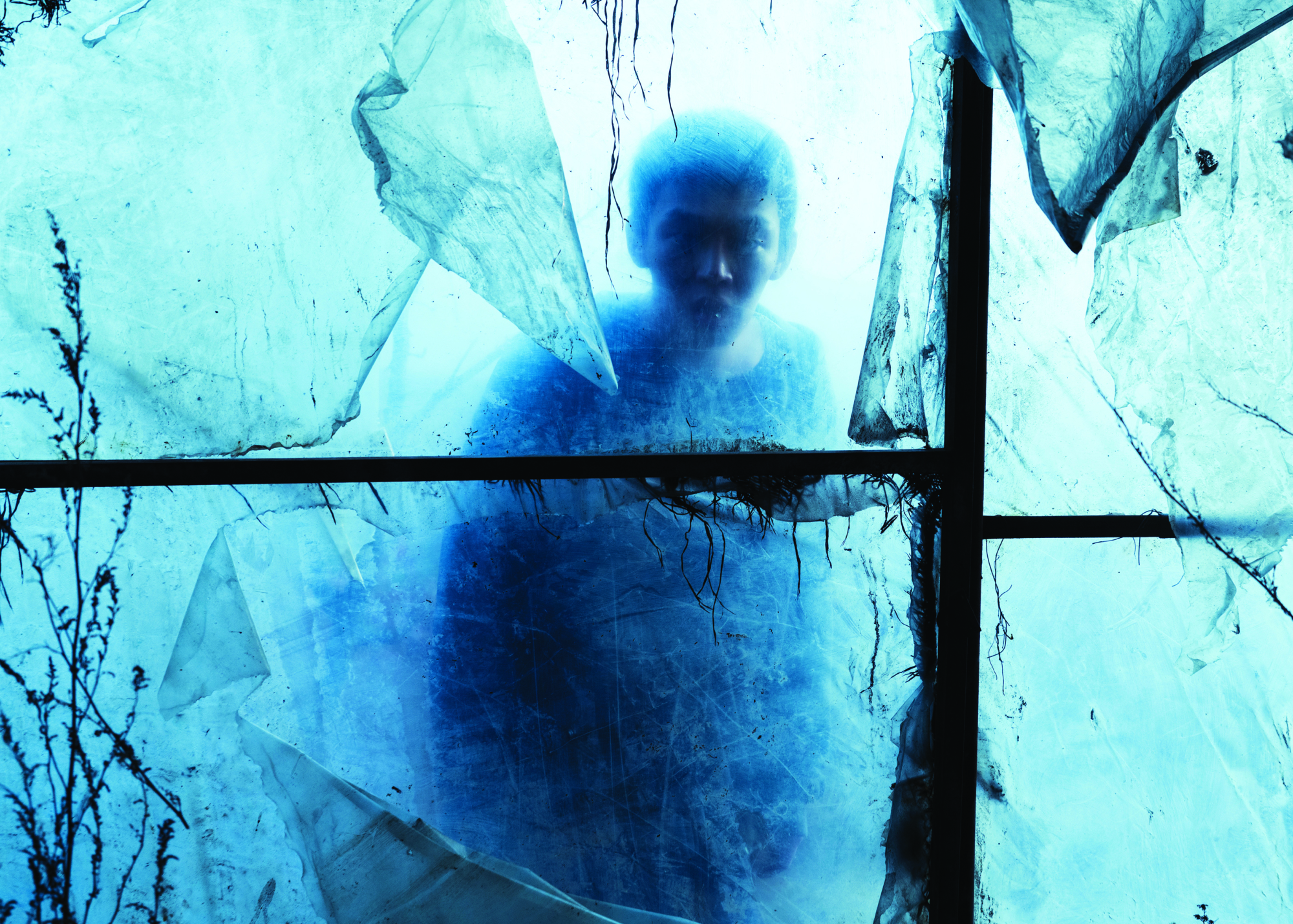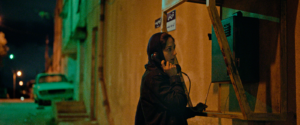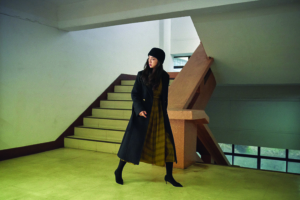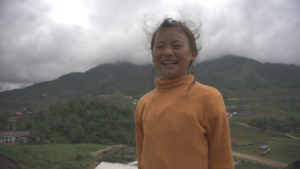What would a president see in Burning (Lee Chang-dong, 2018)? When, at the end of 2018, Barack Obama made like any self-respecting cinephile and posted a films-of-the-year list on his socials,[1]Post dated 29 December 2018 on Barack Obama’s official Facebook page, <https://www.facebook.com/barackobama/posts/10156393283416749>, accessed 27 February 2019. he showed plenty of cred, listing acclaimed arthouse and indie movies, like Burning, alongside the all-conquering Black Panther (Ryan Coogler, 2018). It’s interesting to contemplate what a man who once occupied a seat of such supreme power would love in Lee’s drifting 148-minute tone poem. Its central device, the disappearance of a young woman, Hae-mi (Jun Jong-seo), is never resolved; instead, it’s a mystery that, in staying unsolved, leaves everything about the film mysterious. The thematic subtext of the screenplay, economic inequality, definitely gives it universal resonance. But it was nonetheless surprising, upon scanning the former US president’s faves, to see just how universal that resonance is.
There is a president in Burning, but it’s not Obama. It is, of course, his successor, Donald Trump, a totemic embodiment of economic inequality. Lee could’ve used a more Korean figure, like Park Geun-hye, the daughter of a former totalitarian leader, who found herself impeached as South Korean president in 2016 and eventually imprisoned in 2018 for collusion, corruption and abuses of power.[2]See Choe Sang-Hun, ‘Park Geun-hye, South Korea’s Ousted President, Gets 24 Years in Prison’, The New York Times, 6 April 2018, <https://www.nytimes.com/2018/04/06/world/asia/park-geun-hye-south-korea.html>, accessed 27 February 2019. But Trump, that human sign-o’-the-times, is both more ubiquitous and more specific. In Burning, we hear a presidential speech playing on the television owned by Jong-su (Yoo Ah-in), an aspiring writer who’s been forced – by his father’s legal troubles – to return to his downtrodden hometown and work the family farm. While Trump, in all his grotesque buffoonery, is often deployed as a punchline, here, he’s evoked as a more complex figure: he may embody economic inequality, but his appeal transcends it – or, at least, plays to both sides of the crowd. A simpler film would’ve made him a mirroring symbol for the movie’s ostensible antagonist, Ben (Steven Yeun), Jong-su’s rival for Hae-mi’s affections. Ben is an amoral, aloof, handsome, Americanised, globetrotting rich kid – and possible arsonist and/or murderer – who dwells not in some dust bowl by the Korean border, but in a high-rise in Gangnam. While Trump’s tax policies cater to such one-percenters, his rhetoric is aimed at people like Jong-su: rural victims of economic crisis, stewing in inarticulate rage, looking for someone to blame. ‘This is a film about anger. I think everyone is angry these days. I think it was also some people’s anger that made Trump president,’ Lee said, upon Burning’s release.[3]Lee Chang-dong, quoted in Justin Chang, ‘Director Lee Chang-dong and Actor Steven Yeun on the Profound Mysteries of Burning’, Los Angeles Times, 27 May 2018, <http://www.latimes.com/entertainment/movies/la-et-mn-burning-lee-chang-dong-steven-yeun-20180527-htmlstory.html>, accessed 27 February 2019. ‘The two [characters] exist on opposite ends of the spectrum. But a lot of young people today live somewhere between these two poles. Many feel the helplessness that [Jong-su] feels, but they want to live like Ben.’[4]Lee Chang-dong, quoted in Daniel Kasman, ‘Mysterious Elements: Lee Chang-dong Discusses Burning’, MUBI Notebook, 29 May 2018, <https://mubi.com/notebook/posts/mysterious-elements-lee-chang-dong-discusses-burning>, accessed 27 February 2019.
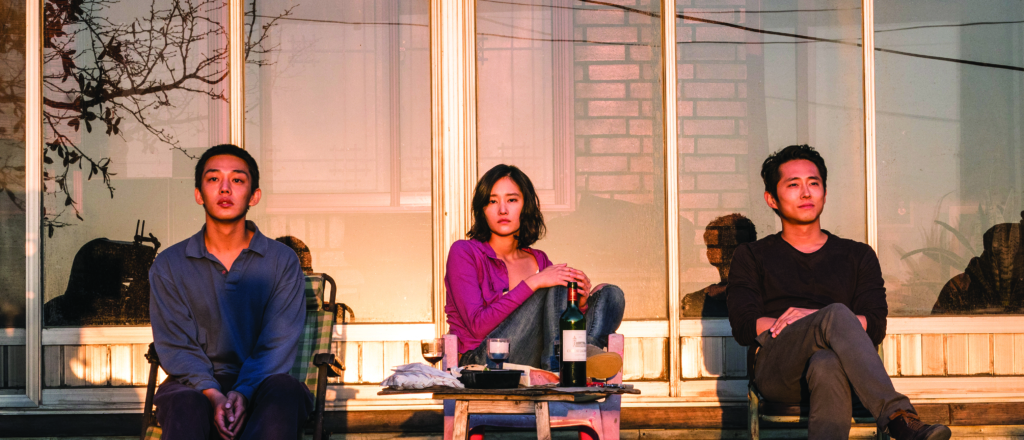
Burning marks, in many ways, Lee’s ascension to prominence in the international consciousness. Though he’d previously directed five features of increasing accomplishment – Green Fish (1997), Peppermint Candy (1999), Oasis (2002), Secret Sunshine (2007) and Poetry (2010) – before Burning, he’d never captured the cinematic zeitgeist, was nowhere near as celebrated as peers like Park Chan-wook or Bong Joon-ho. Born in 1954 in Daegu, South Korea, Lee grew up in a theatre household, but always wanted to be a writer. In 1983, his first novel, Chonri, was published to much local acclaim. Lee only transitioned to cinema when director Park Kwang-su recruited him to co-write the screenplay for To the Starry Island (1993); by then, Lee had been undergoing a midlife crisis, with Korea’s increasingly liberal political climate[5]1992 saw Kim Young-sam elected as the first civilian president since military rule was imposed in 1961. leading him to question his identity as writer. ‘[W]hat it meant to live and work as a writer in Korea [in the 1980s and early 1990s] was to be an activist,’ Lee offered in 1998. ‘I felt like I had lost my direction as a writer […] It was at that point that I felt I should turn to making films.’[6]Lee Chang-dong, quoted in David Walsh, ‘Dirt in the Soul’, World Socialist Web Site, 19 May 1998, <https://www.wsws.org/en/articles/1998/05/fish-m19.html>, accessed 27 February 2019. So Lee made Park an offer: he’d write the screenplay, but only if he could be To the Starry Island’s assistant director, learning the trade on the job.[7]See Stan Glick, ‘ACF 108: Lee Chang-dong E-interview’, AsianCineFest, 3 May 2008, <http://asiancinefest.blogspot.com/2008/05/acf-108-lee-chang-dong-e-interview.html>, accessed 27 February 2019.
After the commercially unremarkable debut of Green Fish, Lee’s next two films, Peppermint Candy and Oasis, were solid box-office successes in Korea, giving him the freedom to explore more idiosyncratic ideas. But, following a brief stint as South Korea’s culture and tourism minister, Lee worked more slowly, questioning the worth of any new idea. This attitude remains today; of Burning, the director muses, ‘[Jong-su] is trying to be a writer and always asking himself, “What kind of story can I write?” Like [Jong-su], I ask myself that all the time, as if I’m a filmmaker who’s just starting his career.’[8]Lee Chang-dong, quoted in Dennis Lim, ‘Interview: Lee Chang-dong’, Film Comment, 25 October 2018, <https://www.filmcomment.com/blog/cannes-interview-lee-chang-dong/>, accessed 27 February 2019. He has also explained: ‘I’ve never made films that [deliver] messages, nor have I ever felt the urge to make such pieces. I just like to ask questions.’[9]Lee Chang-dong, quoted in Yoon Min-sik, ‘Lee Chang-dong Throws Questions, Not Messages, with His Films’, The Korea Herald, 27 May 2018, <http://www.koreaherald.com/view.php?ud=20180527000060>, accessed 27 February 2019.
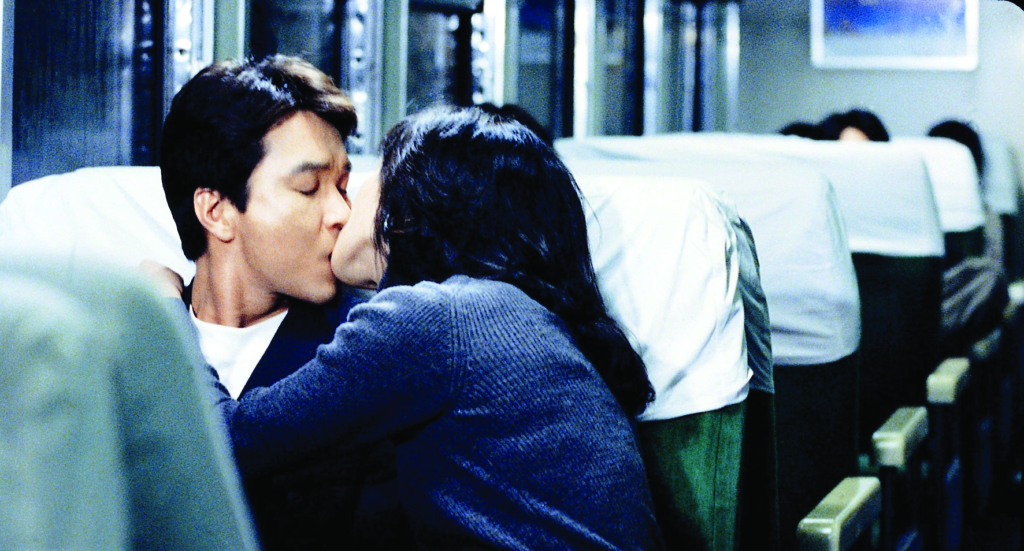
Lee’s questions usually interrogate Korean society. While he has particular filmmaking fondnesses – meting out classic melodrama over slow-moving works of realism, karaoke, incongruously jaunty music, rivers and trains as symbolic images of the movement of time, characters riding in cars and on buses, depictions of people with disabilities – Lee is still a novelist at heart, his micro stories suggesting macro ideas. Through his depictions of patriarchy, hypocrisy, individualised justice/restitution, corruption, bribery, violence, modernisation and economic disenfranchisement, he’s poking at broader social issues. His directorial ‘style’ is largely unobtrusive, observational – ‘I don’t want to make a film in which you defraud reality or betray reality through an illusion,’ Lee has said[10]Lee, quoted in Walsh, op. cit. – leading him to demand that those in front of the camera inhabit the environment, the moment. ‘I am notorious for giving actors a hard time,’ shares Lee.[11]Lee Chang-dong, quoted in Dennis Lim, ‘A Portraitist of a Subdued, Literary Korea’, The New York Times, 30 September 2007, <https://www.nytimes.com/2007/09/30/movies/30lim.html>, accessed 27 February 2019. ‘I often tell my actors “Don’t act.”’[12]Lee Chang-dong, quoted in Glick, op. cit.
Lee is still a novelist at heart, his micro stories suggesting macro ideas. Through his depictions of patriarchy, hypocrisy, individualised justice/restitution, corruption, bribery, violence, modernisation and economic disenfranchisement, he’s poking at broader social issues.
Green Fish, Lee’s debut, is his least-accomplished work. But beneath this oft-generic tale of gangsters, violence and male possessiveness is a portrait of a changing Korea, detailing how rapid modernisation and desperate economic development have created a hyper-capitalist mentality of gaining wealth and status at any cost. ‘The theme of the film is the nature of violence,’ Lee explained, upon its release. ‘Of course there is a diversity of violence, from political violence to gangster violence. But I think violence is violence, regardless of who is committing it.’[13]Lee, quoted in Walsh, op. cit.
Having finished his mandatory military service, Mak-dong (Han Suk-kyu) returns to Ilsan, the rural town where he grew up. His childhood memories are of an agrarian idyll – rice paddies, green fields, streams in which they fished – but Ilsan is rapidly changing, now an exurban developmental hub of apartment towers. He ends up working for a gangster in Seoul, torn between his rural morality/naivety/virginity, his immoral work and his infatuation with femme fatale Mi-ae (Shim Hye-jin), a fading nightclub singer and his boss’s best girl. Green Fish is the tale of a simple country boy corrupted by violence, anger, resentment, lust – something it shares with Burning, no matter how radically different their delivery, suggesting the timelessness of the theme of traditional culture lost in the face of ruthless progress.
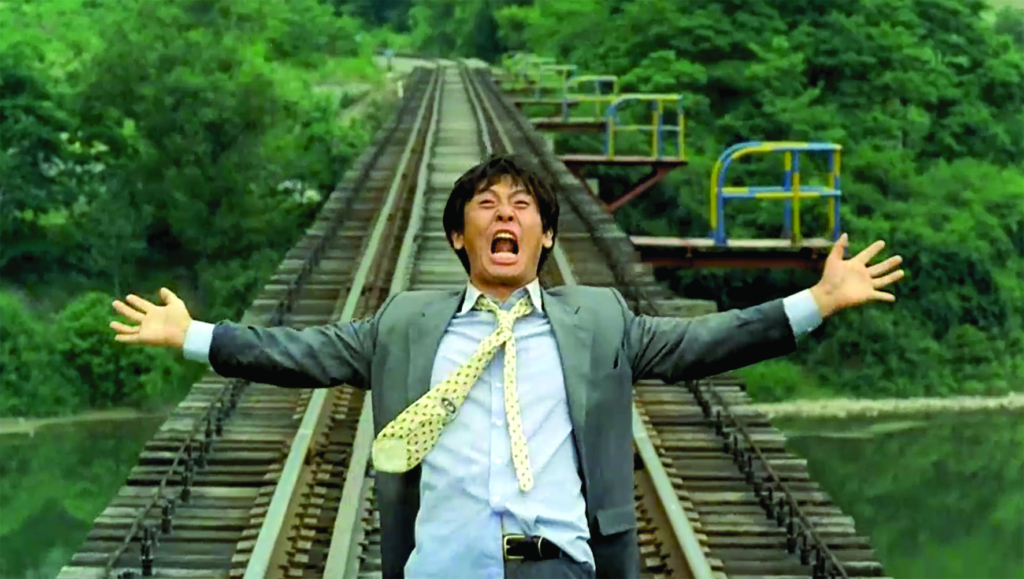
Peppermint Candy is an even more explicit study of an evolving Korea: set at various points throughout recent history, its story mirrors the politico-economic cycles of the nation itself. In a striking gesture – staged a year before Christopher Nolan’s famous Memento (2000) – the plot is presented backwards, retreating through the past, the episodic narrative broken by reversed footage of a train journey (at one point, people are seen running in rewind, foregrounding the device). ‘Peppermint Candy is a film about a sort of time travel. And so I needed a way to visualize time. That’s the train,’ Lee explained in 2008. Describing train travel as having altered ‘mankind’s perception of time’, he went on to say: ‘Film is, of course, a medium that deals with time, and in that sense, the fact that one of the first films ever made is [the Lumière Brothers’] Arrival of a Train [1896] is very symbolic.’[14]Lee, quoted in Glick, op. cit., emphasis removed.
Peppermint Candy opens in Spring 1999 with a sad, drunk salaryman, Yong-ho (Sol Kyung-gu), stumbling along a rubbish-strewn riverbank; there, a party of people have gathered to sing karaoke. He climbs up onto the nearby bridge and stands in front of an oncoming train. As it’s about to strike him, he yells either – depending on your subtitled translation – ‘I want to go back!’ or ‘I am going back!’ From there, we do go back, essentially solving the ‘mystery’ of why this man was driven to suicide. Moving from 1999 through 1994, 1987, 1984, 1980 and, finally, 1979, the narrative refracts the political situations of the nation at those times: financial collapse, economic boom, police brutality, student protest and military state all at play across one man’s life. We see Yong-ho bouncing between two women: his lost love, Sun-im (Moon So-ri), and the wife he never really liked, Hong-ja (Kim Yeo-jin). Peppermint Candy is about masculinity and emasculation, and how progressive youths turn into conservative adults when given money and power. The film ends where it began – on that same riverbank, but twenty years earlier – irony instilled through Yong-ho and Sun-im, young and idealistic, meeting among a sun-dappled gathering of students. It’s here that the origin of the film’s totems – a camera, the titular lollies, trains – is established; it’s a moment of innocence, for both character and Korea, that’ll soon be shattered.
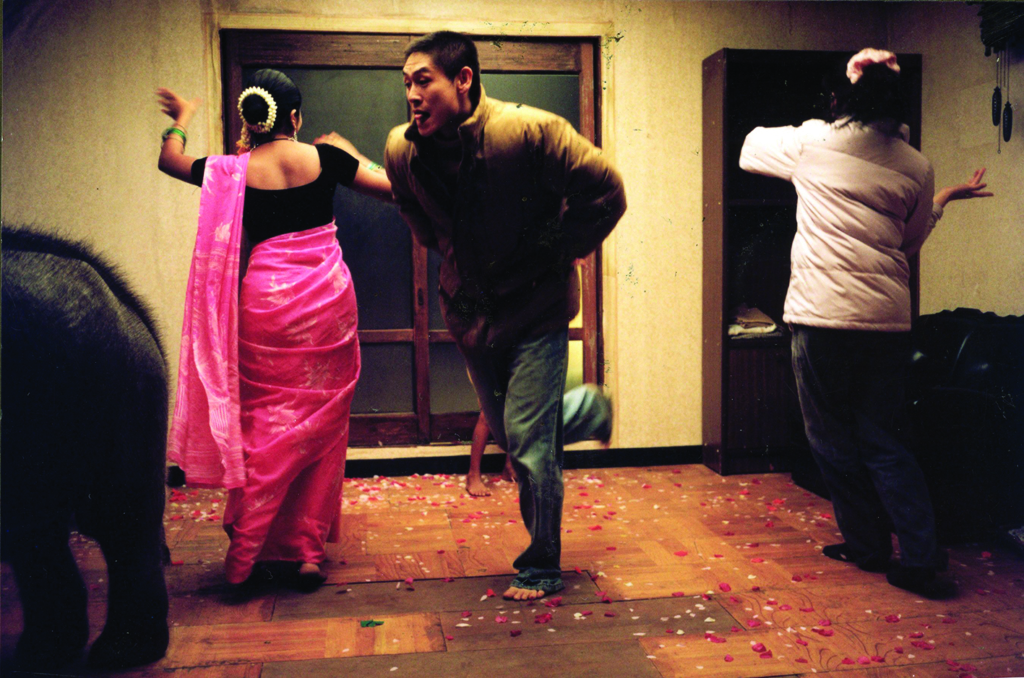
For Oasis, Lee worked again with Peppermint Candy’s leads, casting them in challenging roles: Sol plays an ex-con, Jong-du, with a mild mental disability and wild emotional instability; and Moon plays Gong-ju, a woman with cerebral palsy, with whom he undertakes a scandalous affair. The narrative begets a study of social prejudice, hypocrisy, condescension: a pair of outraged extended families refusing to accept the sexual agency of Gong-ju, that she could be anything but a victim. Running counter to this are scenes of fantasy and magic realism in which Gong-ju is unafflicted, a ‘normal’ woman, free to engage in a regular relationship – scenes that can be read as either Jong-du’s dreams or Gong-ju’s own self-conception. Arriving in 2002, Oasis feels like a corrective to a run of contemporaneous Hollywood films – think: the execrable The Other Sister (Garry Marshall, 1999) – that turned characters with mental disabilities into either cute pets or pitiable sufferers; Lee’s lead characters are complex, contrary, often difficult-to-like people, prone to as many fits of rage as flights of fantasy.
While people involved with the production were worried about how local Christians – a powerful lobby in Korean society – would receive the movie, Lee regarded Secret Sunshine as a sincere exploration of belief.
Secret Sunshine arrived five years later, after Lee’s ministerial stint, and served as a ‘level-up’ work for the director. It’s a study of faith, willing delusion, Korean Christianity, hypocrisy, small-town gossip and paranoia. While people involved with the production were worried about how local Christians – a powerful lobby in Korean society – would receive the movie, Lee regarded Secret Sunshine as a sincere exploration of belief: ‘One of the most important things to me was to find a way to portray things that are not visible to the naked eye, faith being one of them.’[15]Lee, quoted in Lim, ‘A Portraitist of a Subdued, Literary Korea’, op. cit. It stars Jeon Do-yeon – in a role for which she won Best Actress at Cannes – as Shin-ae, a woman who moves, with her young son, to the hometown of her recently deceased husband in an attempt to put their dreary past behind them. Instead, tragedy strikes again: her son, kidnapped; his body, eventually found by a local river. In her grief and depression, Shin-ae embraces the local religious zealots she’d previously avoided; whether she’s prey for cynical recruiters or someone finding faith in dark times is, in that Lee-like way, left open-ended. Her born-again faith is instantly lost, though, when she visits her son’s killer in prison and finds that he, too, has found God, enlightenment, absolution.
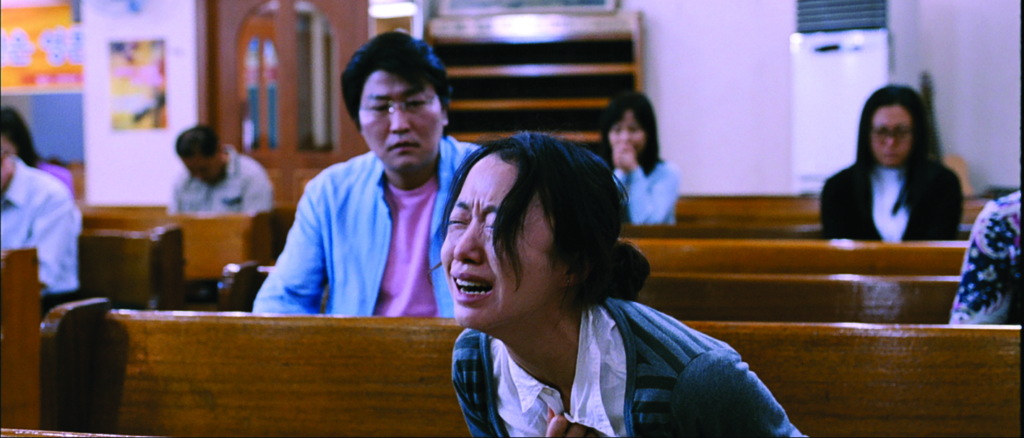
While Secret Sunshine treads bleak emotional terrain, Lee never shies away from absurdity, inserting comic protest, mischievous sabotage, karaoke and macho bluster amid the drama. Song Kang-ho plays Jong-chan, a would-be love interest who’s had his affections set on Shin-ae from the start – a puppy-doggish figure of masculine cluelessness and man-child pining. An exchange with a friend who’s dismissing Jong-chan’s romantic chances feels like greater commentary on the film itself: ‘You’re like a melodrama, dude, [but] you don’t look the part,’ the friend says, to which he replies, ‘Your view’s too narrow. It could be comic melodrama.’
Lee’s subsequent work, Poetry, feels like a much less comic companion to Secret Sunshine: another film about tragedy, crime, punishment and moral reckoning in a gossipy small town. It opens with a close-up of a rushing river, before showing a dead body floating on its current – a body that turns out to be a local schoolgirl who’s taken her life by jumping from a traffic bridge. Eventually, it’s revealed that she was raped by a gang of schoolmates; Lee has admitted that his ‘main motive for making this film’ was to address ‘a sexual assault committed by a group of juveniles in a small town in South Korea’ that had occurred a few years prior.[16]Lee Chang-dong, quoted in David Jenkins, ‘The Poetry of Lee Chang-dong’, TimeOut London, <https://www.timeout.com/london/film/the-poetry-of-lee-chang-dong-1>, accessed 27 February 2019.
Abhorring conventional depictions of ‘justice’ in films,[17]See Sarah Cronin, ‘Poetry: Interview with Lee Chang-dong’, Electric Sheep, 27 July 2011, <http://www.electricsheepmagazine.co.uk/features/2011/07/27/poetry-interview-with-lee-chang-dong/>, accessed 27 February 2019. the director sought an unexpected way in to the story. That comes through its principal character, Mi-ja (Yun Jeong-hee), a sixty-something woman who, in the early stages of Alzheimer’s, joins a local writing group in the hope of penning her first ever poem. Mi-ja is ‘young at heart’, prone to flattery, filled with vanity, her elaborate outfits at odds with her downtrodden social station. She’s the guardian to her moody, dude-ish grandson Wook (Lee David), who, it turns out, is one of the rapists. Mi-ja learns this when a group of fathers – she’s the only woman in their midst – gets together, working out how they’re going to ‘solve’ the shared problem of their criminal kids. Both the school and the family of the victim want to avoid scandal and agree to bought silence, the fathers offering to pay 30 million won in ‘restitution’ to settle the situation (Oasis also highlights this particular form of Korean economic ‘justice’). Mi-ja doesn’t have her share of the money, but, even as she enacts her own questionable plans to come into the cash, and continues to lovingly feed her grandson at home, she struggles under the moral weight of the pay-off. At the same time, she flounders writing her first poem, only finding ‘inspiration’, perhaps troublingly, with the discovery of her grandson’s guilt and upon meeting the dead girl’s family. The uneasy alliance between tragedy and creativity in Poetry’s narrative was Lee interrogating himself with ‘[q]uestions like, why do I write novels and make films; and to what extent my writings or films can affect the world’. He continued: ‘Art is a pursuit for beauty and there is the question of how it is related to the filth and vice of the world. The question is similar to what Theodor Adorno had asked: is it possible to write lyric poetry after Auschwitz?’[18]Lee Chang-dong, quoted in ibid.
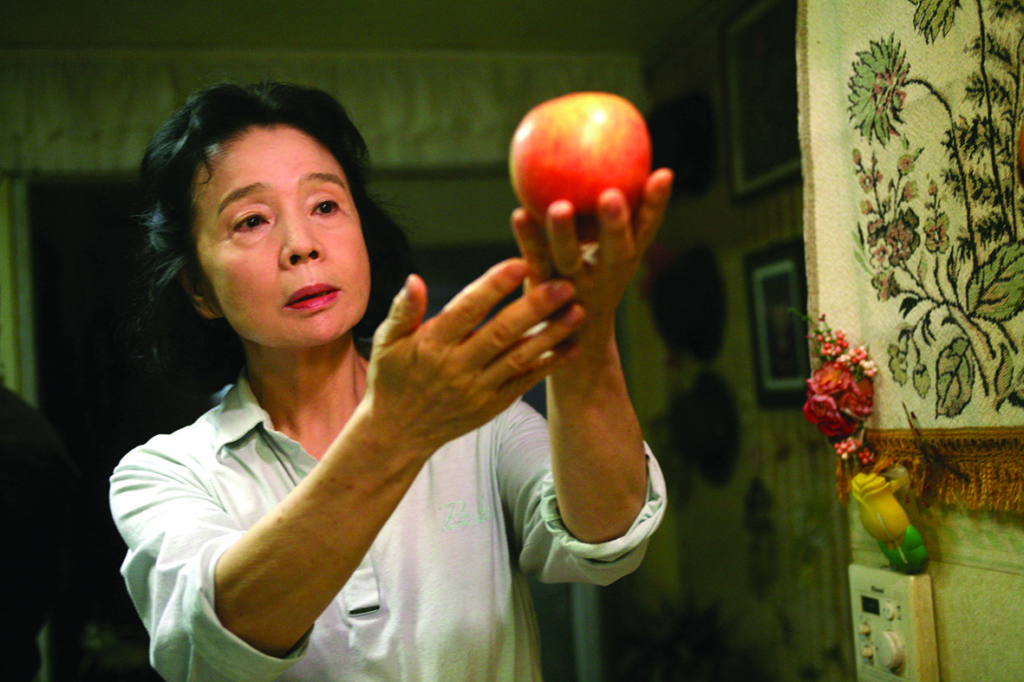
After Poetry, Lee devised three scripts that he ‘didn’t have the conviction to make’ into film, each of which dealt with ‘the anger and helplessness of young people today’.[19]Lee, quoted in Lim, ‘Interview: Lee Chang-dong’, op. cit. He eventually found the right vessel for that theme in a 1983 short story by Haruki Murakami, ‘Barn Burning’, whose brevity and abstraction – it’s a story about telling stories – hardly make it an immediate candidate for adaptation. But Lee was attracted to both its mystery (boy loses girl to rich cad, then girl vanishes without a trace) and its mysteriousness, which ‘gave [him] a lot of room to develop and expand into the cinematic medium’.[20]Lee, quoted in Kasman, op. cit.
Burning’s own title is taken from an act of destruction that could be either cathartic or meaningless, meaning forever tough to pin down in a picture so open-ended, so slippery, so uninterested in solving its own mysteries.
Burning, Lee’s grand adaptation, uses this simple story to explore so many of his favourite themes: how social injustice manifests as violence, and economic disenfranchisement as rage; how the individual’s pursuit of justice in a corrupt society leads to their own corruption; how Korea’s changing society, and the forward march of progress, leaves poor, rural people behind. It’s also a film about being young, and the yearning for something beyond your station – whether it be a girl (for Jong-su), freedom and enlightenment through travel (for Hae-mi) or ways to combat the ennui of wealth (for Ben). ‘[P]roblems are more individualized […] Everyone has their own reasons for being angry,’ Lee has said.[21]Lee Chang-dong, quoted in Karen Han, ‘Burning Is the Angry as Hell Movie We Need Right Now’, VICE, 27 October 2018, <https://www.vice.com/en_us/article/evwe9a/burning-is-the-angry-as-hell-movie-we-need-right-now>, accessed 27 February 2019. The greater theme, he offers, is that ‘the millennials living in Korea today will be the first generation that are worse off than their parents’ generation […] This film is about young people who feel impotent, with rage bottled up inside them.’ When working on his various post-Poetry screenplays, interrogating this theme, Lee even called this new undertaking ‘Project Rage’.[22]Lee Chang-dong, quoted in Patrick Frater, ‘Burning Director Lee Chang-dong: Still Angry After All These Years’, Variety, 3 December 2018, <https://variety.com/2018/film/asia/lee-chang-dong-burning-cannes-1202812485/>, accessed 27 February 2019.
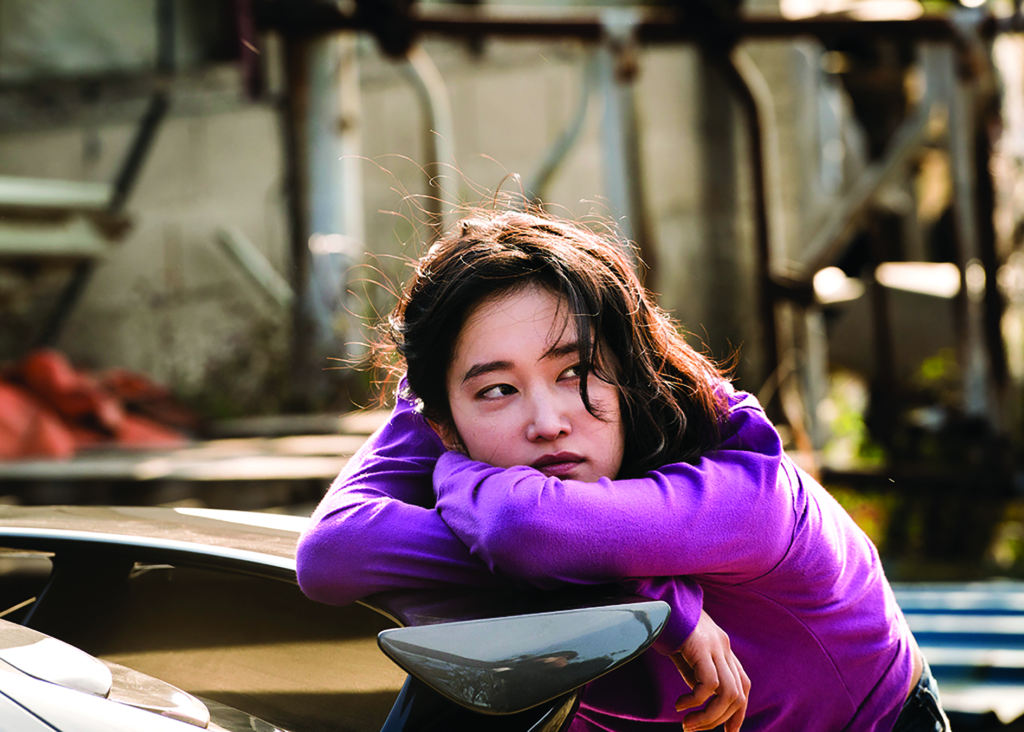
Burning’s own title is taken from an act of destruction that could be either cathartic or meaningless, meaning forever tough to pin down in a picture so open-ended, so slippery, so uninterested in solving its own mysteries. Movies lacking resolution aren’t usually beloved by audiences – and presidents – but Burning charms viewers with the glow of both its handsome cast and its handsome cinematography (by Hong Kyung-pyo, a Bong collaborator with whom Lee had never worked before). The film is largely shot during that glorious photographic time known as ‘magic hour’ – at dawn and dusk – making it look far more beautiful than his previous pictures. This isn’t empty style, though, but rather an approach playing into Burning’s mysterious tone and deeper themes, depicting the ‘boundary that exists between light and darkness’.[23]Lee Chang-dong, quoted in Amir Ganjavie, ‘Slow-burn: Director Lee Chang-dong on Storyboarding, Shooting, Lighting, and Scoring Burning’, MovieMaker, 14 November 2018, <https://www.moviemaker.com/archives/moviemaking/directing/interview-with-lee-chang-dong/>, accessed 27 February 2019. Its centrepiece is a scene in which Hae-mi, right before her disappearance, dances her ‘dance of the Great Hunger’, of yearning, of sexual liberation – a silhouette set against the radiant dusk horizon. She moves along borders: between two men vying for her attention, between South and North Korea, between day and night. This scene, according to Lee, ‘reflects the mystery of this movie, the uncertain line between truth and lies, the real and the false’.[24]Lee, quoted in Lim, ‘Interview: Lee Chang-dong’, op. cit.
For Yeun, a millennial acting in this film about millennials, this mystery resonates with the contemporary moment. ‘What realities are we living in? How many masks do we have on? How many versions of ourselves do we have? Are we real, are we not?’ he asks,[25]Steven Yeun, quoted in Tasha Robinson, ‘Steven Yeun on Burning, The Walking Dead, and Changing Roles for Asian-Americans’, The Verge, 4 November 2018, <https://www.theverge.com/2018/11/4/18057584/steven-yeun-interview-walking-dead-burning-sorry-to-bother-you-asian-roles-korean-haruki-murakami>, accessed 27 February 2019. the actor taking his director’s cue of raising endless questions. It’s no surprise, then, that Burning struck a chord in 2018 (and beyond), ending up on all manner of best-of lists, be they by Barry O or no. In its enigma and its rage, we find a tale in which rural Korea evokes the digital dystopia: that global feed wherein the same environmental and presidential horrors are splattered all over the one infinite scroll, uniting a generation of plural identities in singular anger.
Endnotes
| 1 | Post dated 29 December 2018 on Barack Obama’s official Facebook page, <https://www.facebook.com/barackobama/posts/10156393283416749>, accessed 27 February 2019. |
|---|---|
| 2 | See Choe Sang-Hun, ‘Park Geun-hye, South Korea’s Ousted President, Gets 24 Years in Prison’, The New York Times, 6 April 2018, <https://www.nytimes.com/2018/04/06/world/asia/park-geun-hye-south-korea.html>, accessed 27 February 2019. |
| 3 | Lee Chang-dong, quoted in Justin Chang, ‘Director Lee Chang-dong and Actor Steven Yeun on the Profound Mysteries of Burning’, Los Angeles Times, 27 May 2018, <http://www.latimes.com/entertainment/movies/la-et-mn-burning-lee-chang-dong-steven-yeun-20180527-htmlstory.html>, accessed 27 February 2019. |
| 4 | Lee Chang-dong, quoted in Daniel Kasman, ‘Mysterious Elements: Lee Chang-dong Discusses Burning’, MUBI Notebook, 29 May 2018, <https://mubi.com/notebook/posts/mysterious-elements-lee-chang-dong-discusses-burning>, accessed 27 February 2019. |
| 5 | 1992 saw Kim Young-sam elected as the first civilian president since military rule was imposed in 1961. |
| 6 | Lee Chang-dong, quoted in David Walsh, ‘Dirt in the Soul’, World Socialist Web Site, 19 May 1998, <https://www.wsws.org/en/articles/1998/05/fish-m19.html>, accessed 27 February 2019. |
| 7 | See Stan Glick, ‘ACF 108: Lee Chang-dong E-interview’, AsianCineFest, 3 May 2008, <http://asiancinefest.blogspot.com/2008/05/acf-108-lee-chang-dong-e-interview.html>, accessed 27 February 2019. |
| 8 | Lee Chang-dong, quoted in Dennis Lim, ‘Interview: Lee Chang-dong’, Film Comment, 25 October 2018, <https://www.filmcomment.com/blog/cannes-interview-lee-chang-dong/>, accessed 27 February 2019. |
| 9 | Lee Chang-dong, quoted in Yoon Min-sik, ‘Lee Chang-dong Throws Questions, Not Messages, with His Films’, The Korea Herald, 27 May 2018, <http://www.koreaherald.com/view.php?ud=20180527000060>, accessed 27 February 2019. |
| 10 | Lee, quoted in Walsh, op. cit. |
| 11 | Lee Chang-dong, quoted in Dennis Lim, ‘A Portraitist of a Subdued, Literary Korea’, The New York Times, 30 September 2007, <https://www.nytimes.com/2007/09/30/movies/30lim.html>, accessed 27 February 2019. |
| 12 | Lee Chang-dong, quoted in Glick, op. cit. |
| 13 | Lee, quoted in Walsh, op. cit. |
| 14 | Lee, quoted in Glick, op. cit., emphasis removed. |
| 15 | Lee, quoted in Lim, ‘A Portraitist of a Subdued, Literary Korea’, op. cit. |
| 16 | Lee Chang-dong, quoted in David Jenkins, ‘The Poetry of Lee Chang-dong’, TimeOut London, <https://www.timeout.com/london/film/the-poetry-of-lee-chang-dong-1>, accessed 27 February 2019. |
| 17 | See Sarah Cronin, ‘Poetry: Interview with Lee Chang-dong’, Electric Sheep, 27 July 2011, <http://www.electricsheepmagazine.co.uk/features/2011/07/27/poetry-interview-with-lee-chang-dong/>, accessed 27 February 2019. |
| 18 | Lee Chang-dong, quoted in ibid. |
| 19 | Lee, quoted in Lim, ‘Interview: Lee Chang-dong’, op. cit. |
| 20 | Lee, quoted in Kasman, op. cit. |
| 21 | Lee Chang-dong, quoted in Karen Han, ‘Burning Is the Angry as Hell Movie We Need Right Now’, VICE, 27 October 2018, <https://www.vice.com/en_us/article/evwe9a/burning-is-the-angry-as-hell-movie-we-need-right-now>, accessed 27 February 2019. |
| 22 | Lee Chang-dong, quoted in Patrick Frater, ‘Burning Director Lee Chang-dong: Still Angry After All These Years’, Variety, 3 December 2018, <https://variety.com/2018/film/asia/lee-chang-dong-burning-cannes-1202812485/>, accessed 27 February 2019. |
| 23 | Lee Chang-dong, quoted in Amir Ganjavie, ‘Slow-burn: Director Lee Chang-dong on Storyboarding, Shooting, Lighting, and Scoring Burning’, MovieMaker, 14 November 2018, <https://www.moviemaker.com/archives/moviemaking/directing/interview-with-lee-chang-dong/>, accessed 27 February 2019. |
| 24 | Lee, quoted in Lim, ‘Interview: Lee Chang-dong’, op. cit. |
| 25 | Steven Yeun, quoted in Tasha Robinson, ‘Steven Yeun on Burning, The Walking Dead, and Changing Roles for Asian-Americans’, The Verge, 4 November 2018, <https://www.theverge.com/2018/11/4/18057584/steven-yeun-interview-walking-dead-burning-sorry-to-bother-you-asian-roles-korean-haruki-murakami>, accessed 27 February 2019. |
